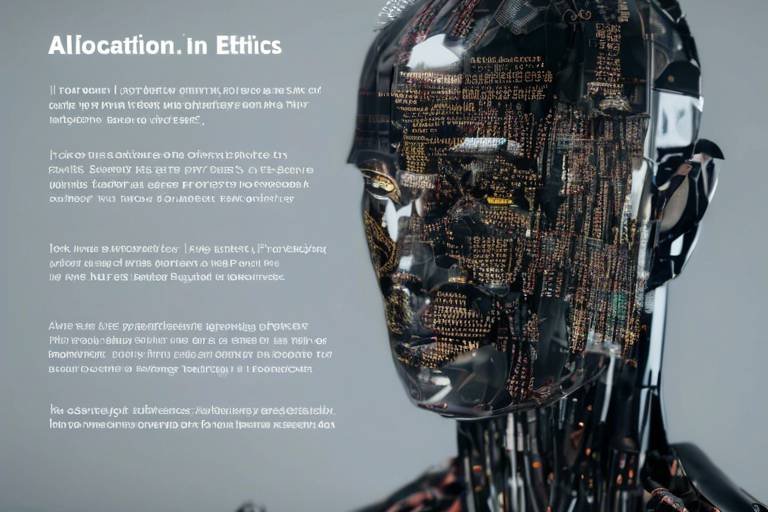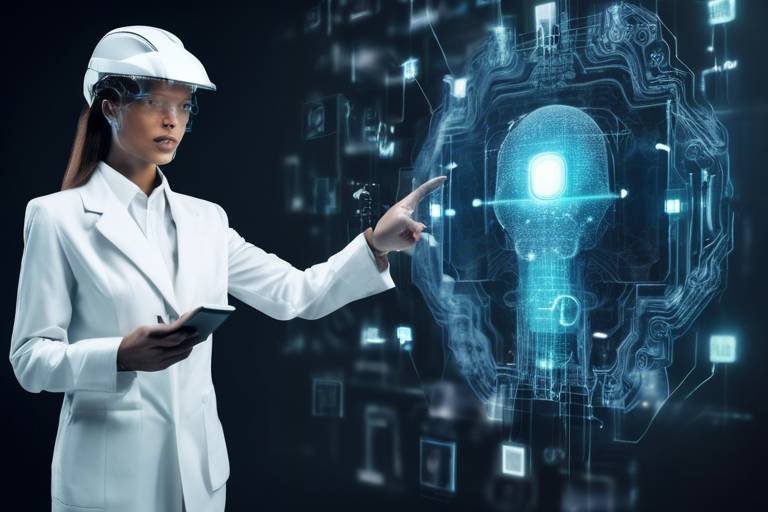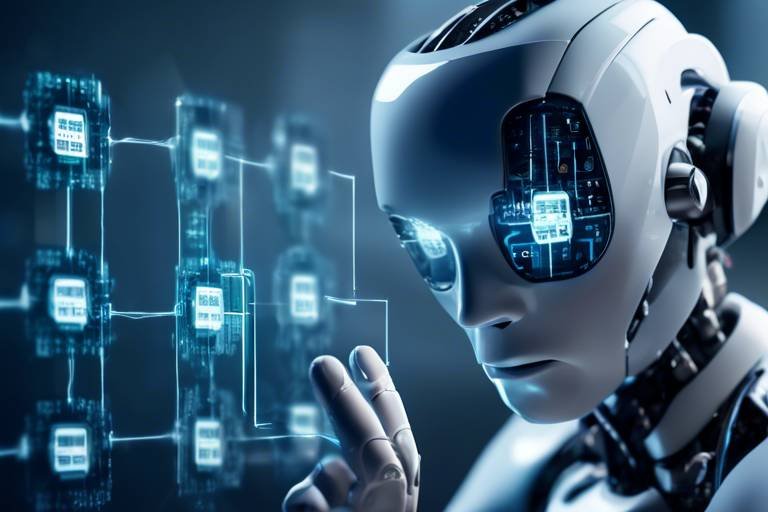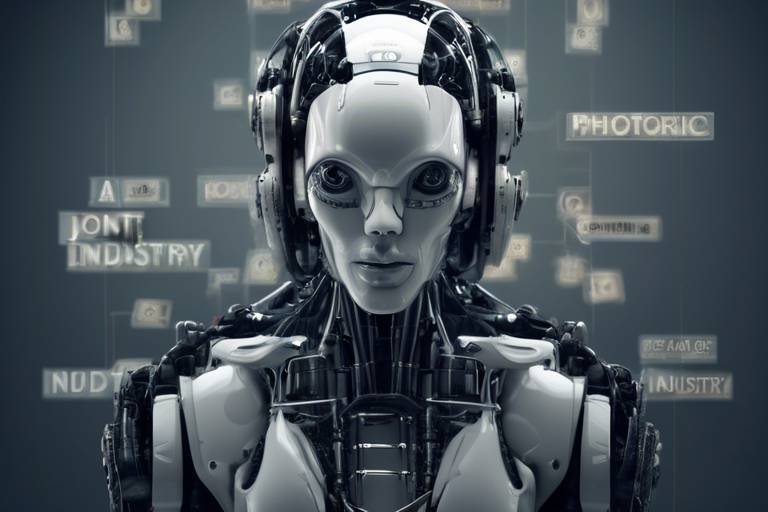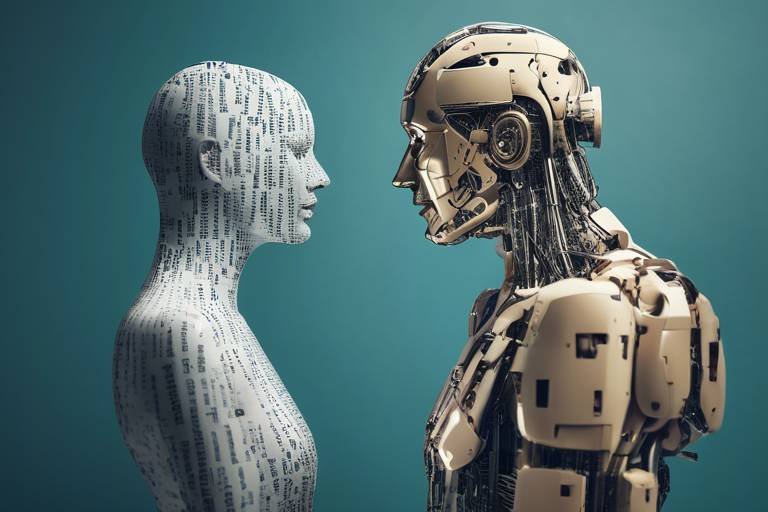AI & Ethics: Issue or Opportunity?
In today's fast-paced technological landscape, the intersection of artificial intelligence (AI) and ethics has become a hot topic of discussion. As AI systems become increasingly integrated into our daily lives, they bring forth a myriad of questions that challenge our traditional ethical frameworks. Are we on the brink of a technological revolution that could redefine our understanding of morality, or are we merely opening a Pandora's box filled with ethical dilemmas? This article explores the complex relationship between AI and ethical considerations, examining both the challenges and opportunities that arise in this rapidly evolving field.
AI is not just a tool; it’s a powerful entity that can shape our world in profound ways. From self-driving cars to AI-driven healthcare solutions, the potential applications are limitless. Yet, with great power comes great responsibility. The ethical implications of these technologies can be staggering, prompting us to ask: who is accountable when AI makes a mistake? How do we ensure that these systems operate fairly and without bias? The answers to these questions are not straightforward, and they require a deep dive into the foundational concepts of AI ethics.
Understanding AI ethics is crucial for navigating this complex landscape. At its core, AI ethics revolves around principles that guide the responsible development and deployment of AI technologies. These principles often include transparency, fairness, accountability, and privacy. As we delve deeper into these concepts, it becomes clear that the ethical implications of AI are not just theoretical; they have real-world consequences that can affect individuals and communities alike.
On one hand, the challenges posed by AI ethics may seem daunting. Issues such as bias, privacy concerns, and the question of accountability are pressing matters that demand our attention. For instance, biased algorithms can lead to unfair outcomes in critical areas like hiring, lending, and law enforcement. On the other hand, the opportunities presented by AI are equally compelling. When harnessed ethically, AI has the potential to drive significant positive change, addressing social issues and improving quality of life.
As we navigate through this complex relationship between AI and ethics, it’s essential to recognize that we are at a crossroads. The decisions we make today will shape the future of AI and its impact on society. So, are we ready to embrace the opportunities while effectively addressing the ethical challenges? This article aims to provide insights into both sides of the equation, helping readers understand the delicate balance we must strike in the age of AI.
- What is AI ethics? AI ethics refers to the moral principles that guide the development and use of artificial intelligence technologies, ensuring they are used responsibly and fairly.
- Why is bias in AI a concern? Bias in AI can lead to unfair treatment of individuals, impacting decisions in areas like hiring, lending, and law enforcement, which can perpetuate existing inequalities.
- How can we mitigate bias in AI? Mitigating bias involves implementing best practices in data collection, algorithm design, and ongoing monitoring to ensure fairness and equity in AI outcomes.
- What are the opportunities for ethical AI? Ethical AI can be leveraged for social good, addressing issues in healthcare, education, and environmental sustainability, among others.
- What role do regulatory frameworks play in AI ethics? Regulatory frameworks help establish guidelines for responsible AI development, promoting innovation while ensuring ethical considerations are addressed.

Understanding AI Ethics
The world of artificial intelligence (AI) is not just about algorithms and data; it’s a complex tapestry woven with ethical considerations that are crucial for its responsible development. AI ethics is the field that examines the moral implications of AI technologies, aiming to ensure that these innovations benefit society while minimizing harm. As we dive deeper into this topic, it’s essential to understand the foundational concepts that guide the ethical deployment of AI.
At its core, AI ethics revolves around several key principles that serve as a compass for developers, policymakers, and users alike. These principles include transparency, fairness, accountability, and privacy. Each of these concepts plays a vital role in shaping how AI systems are designed and implemented. For instance, transparency requires that the processes behind AI decision-making are clear and understandable, allowing users to grasp how outcomes are derived. This is particularly important in high-stakes areas like healthcare and criminal justice, where decisions can significantly impact lives.
Furthermore, the principle of fairness addresses the need to eliminate bias in AI systems. It is crucial that AI technologies do not perpetuate existing inequalities or create new forms of discrimination. This is where accountability comes into play; developers and organizations must be held responsible for the outcomes of their AI applications. This accountability is not just a moral obligation but a necessary step to build trust with users and stakeholders.
Privacy is another cornerstone of AI ethics. As AI systems often rely on vast amounts of personal data, safeguarding individual privacy becomes paramount. This involves not only protecting sensitive information but also ensuring that data is used ethically and with consent. The challenge lies in balancing the benefits of AI—such as improved services and efficiencies—with the rights of individuals to control their own data.
In summary, understanding AI ethics is not merely an academic exercise; it is a practical necessity in today’s technology-driven world. As we continue to innovate, we must remain vigilant about the ethical implications of our creations. By adhering to these principles, we can harness the power of AI to improve lives while ensuring that we do not compromise our values in the process.

Ethical Challenges in AI
As we dive into the world of artificial intelligence, it becomes increasingly clear that with great power comes great responsibility. The rapid advancement of AI technologies has not only transformed industries but also brought to light a myriad of ethical challenges that we must confront. These challenges are not just theoretical; they have real-world implications that affect individuals, communities, and societies at large. So, what are these ethical dilemmas, and how do they shape our interaction with AI?
One of the most pressing concerns is bias in AI algorithms. When we think about bias, we often envision a scale tipped unfairly in one direction, leading to skewed outcomes. This bias can manifest in various forms, from racial and gender biases to socioeconomic disparities. But how does this bias creep into AI systems? It typically stems from the data used to train these algorithms. If the training data reflects existing prejudices or is not representative of the population, the AI will inevitably perpetuate these biases in its decision-making processes.
Moreover, the implications of biased AI are far-reaching. For instance, consider an AI system used in hiring practices. If the algorithm is trained on historical hiring data that favored certain demographics, it may continue to favor those groups, overlooking qualified candidates from underrepresented backgrounds. This not only undermines the principles of fairness and equity but also reinforces systemic inequality. Thus, addressing bias in AI is not just a technical challenge; it is a moral imperative.
Another significant ethical challenge lies in the realm of privacy and surveillance. As AI technologies become more integrated into our daily lives, concerns about how our personal data is collected, stored, and utilized become paramount. With the rise of smart devices and surveillance cameras powered by AI, the line between safety and privacy is increasingly blurred. Are we sacrificing our privacy for the sake of security? This question is at the heart of the debate surrounding AI ethics.
For example, consider the use of facial recognition technology in public spaces. While it can enhance security measures, it also raises questions about consent and the potential for misuse. Who has access to this data? How long is it stored? And what happens if it falls into the wrong hands? These are critical questions that demand robust ethical frameworks to ensure that AI technologies are deployed responsibly.
To tackle these ethical challenges effectively, we need to establish comprehensive frameworks that address bias, privacy, and accountability. Such frameworks should include:
- Transparent data collection practices
- Regular audits of AI systems for bias detection
- Clear guidelines on data usage and privacy protections
- Accountability measures for organizations deploying AI technologies
In conclusion, while the ethical challenges posed by AI are daunting, they are not insurmountable. By acknowledging these issues and actively working towards solutions, we can harness the power of AI for the greater good. The journey towards ethical AI is ongoing, and it requires the collaboration of technologists, ethicists, policymakers, and society as a whole.
Q: What is AI bias?
A: AI bias refers to the tendency of AI systems to produce unfair or prejudiced outcomes due to biased training data or algorithmic design.
Q: Why is privacy a concern in AI?
A: Privacy concerns arise from the extensive data collection practices of AI technologies, which can lead to surveillance and misuse of personal information.
Q: How can we mitigate bias in AI?
A: Mitigating bias involves using diverse and representative training data, conducting regular audits, and implementing transparency in AI systems.

Bias in AI Algorithms
Bias in artificial intelligence (AI) algorithms is a critical issue that can lead to unfair and discriminatory outcomes. Imagine a world where decisions that affect your life—like hiring for a job, granting loans, or even determining your eligibility for healthcare—are made by algorithms that harbor biases. It's not just a possibility; it's a reality that many are facing today. Bias in AI can stem from various sources, including the data used to train these algorithms and the design choices made by developers.
One of the most alarming aspects of biased AI is its potential to perpetuate existing inequalities. For instance, if an AI system is trained on historical data that reflects past prejudices, it may inadvertently learn to replicate these biases. This can lead to a cycle where marginalized groups continue to be disadvantaged, while those in power maintain their privilege. In sectors like criminal justice, biased algorithms can result in unfair sentencing or profiling, illustrating the urgent need for ethical considerations in AI development.
To understand the depth of this issue, let’s explore the sources of bias in AI algorithms:
- Data Collection: If the data used to train AI systems is skewed or unrepresentative, the algorithm will likely produce biased outcomes. For example, facial recognition systems have been shown to misidentify individuals from minority groups due to a lack of diverse training data.
- Algorithmic Design: The choices developers make when designing algorithms can introduce bias. This includes the features selected for analysis and the methods used to process data.
- Feedback Loops: AI systems can create feedback loops where biased outcomes reinforce the data that the system is trained on, further entrenching existing biases.
Addressing bias in AI is not just about recognizing its existence; it's about taking actionable steps to mitigate it. Developers and organizations must implement best practices to ensure fairness and equity in AI systems. This includes regularly auditing algorithms for bias, using diverse datasets, and involving a varied group of stakeholders in the development process. By doing so, we can work towards creating AI systems that are not only advanced but also just and equitable.
In conclusion, bias in AI algorithms poses significant ethical challenges that we must confront head-on. The stakes are high, and the implications of ignoring these biases can be devastating. As we continue to integrate AI into our daily lives, it is crucial to prioritize ethical considerations to ensure that technology serves all of humanity fairly.
- What is bias in AI? Bias in AI refers to systematic errors in algorithms that result in unfair treatment of individuals or groups, often based on race, gender, or socio-economic status.
- How does bias affect AI decision-making? Bias can lead to discriminatory outcomes in various applications, such as hiring practices, law enforcement, and lending, often perpetuating existing inequalities.
- What can be done to mitigate bias in AI? Strategies include using diverse datasets, conducting regular audits of algorithms, and involving a variety of stakeholders in the development process.

Sources of Bias
Understanding the in artificial intelligence is crucial for developing systems that are fair and equitable. Bias in AI doesn't just appear out of thin air; it originates from various stages of the AI development process. One of the primary sources is the data used to train AI models. If the data is not representative of the diverse populations it aims to serve, the AI will inevitably reflect those disparities, leading to skewed results. For instance, if an AI system is trained predominantly on data from one demographic group, it may perform poorly for individuals outside that group, ultimately resulting in discriminatory outcomes.
Another significant source of bias comes from the algorithmic design itself. The choices made by developers during the design phase can greatly influence how an AI system interprets data. If the algorithms prioritize certain features over others, they may inadvertently reinforce existing stereotypes or inequalities. This is akin to a photographer choosing to focus on a specific subject while ignoring the background, which can distort the overall picture. In the context of AI, this can lead to a narrow view that doesn't capture the full complexity of human experience.
Moreover, bias can also creep in through human factors. Developers, consciously or unconsciously, bring their own biases into the coding process. This can manifest in the way they label data, the features they choose to include, or even the objectives they set for the AI. If a developer has a particular worldview, it may influence the AI's behavior in ways that align with that perspective, thus perpetuating bias. It's essential to recognize that AI is not just a machine; it is a reflection of the people who create it.
Lastly, the feedback loops generated by AI systems can also lead to bias. When an AI system is deployed, it often learns from new data that it encounters. If this data is biased, the AI will continue to evolve in a skewed manner. For example, a recommendation system that suggests products based on past purchases can create a cycle where the same types of products are repeatedly promoted, limiting exposure to diverse options. This can be particularly problematic in areas like job recruitment or credit scoring, where biased recommendations can have serious implications for individuals' lives.
Ultimately, addressing these sources of bias requires a multifaceted approach. Developers must be vigilant about the data they use, the algorithms they design, and the potential human biases they bring into their work. By fostering a culture of awareness and accountability, we can work towards creating AI systems that truly serve all members of society equitably.
- What is AI bias? AI bias refers to the systematic and unfair discrimination that occurs when AI systems produce results that are prejudiced due to flawed data or algorithms.
- How can bias in AI be mitigated? Mitigating bias can be done through diverse data collection, regular audits of AI systems, and inclusive design practices that consider various demographic groups.
- Why is understanding the sources of bias important? Understanding the sources of bias is critical to developing fair AI systems that do not perpetuate existing inequalities and to fostering trust in AI technologies.

Mitigating Bias
In the ever-evolving landscape of artificial intelligence, is not just a technical challenge; it’s a moral imperative. As we integrate AI into critical areas such as hiring, law enforcement, and healthcare, we must ensure that these systems operate fairly and equitably. The consequences of bias in AI can be profound, leading to discrimination, inequality, and a loss of trust in technology. So, how do we tackle this pressing issue? Let's dive into some effective strategies.
First and foremost, diverse data collection is key. AI systems learn from data, and if that data reflects historical biases, the AI will likely perpetuate those biases. By ensuring that the datasets used to train AI models are diverse and representative, we can help minimize the risk of biased outcomes. This means actively seeking out data that includes various demographic groups, perspectives, and experiences. It’s like trying to bake a cake: if you only use one type of flour, you won't get the rich, complex flavor that comes from a blend.
Moreover, algorithmic transparency plays a critical role in bias mitigation. Developers should strive to make their algorithms understandable and explainable. When stakeholders can see how decisions are made, it becomes easier to identify and correct biases. Imagine trying to solve a mystery without knowing the clues; it’s nearly impossible! By shedding light on the inner workings of AI, we empower users to question and challenge biased outcomes.
Another effective strategy is the implementation of regular audits of AI systems. These audits should assess the performance of AI models across different demographic groups to ensure that no group is unfairly disadvantaged. Regular checks can reveal hidden biases that may not be apparent during initial testing. By treating AI systems like living organisms that require ongoing health checks, we can maintain their fairness and integrity.
Finally, fostering a culture of ethical AI development is essential. Organizations should prioritize ethics in their AI initiatives by involving ethicists and diverse stakeholders in the development process. This collaborative approach can help surface potential biases early on and create a more inclusive environment for innovation. After all, when a team of diverse minds comes together, they are more likely to identify blind spots that a homogeneous group might overlook.
In summary, mitigating bias in AI is a multifaceted challenge that requires a combination of diverse data collection, algorithmic transparency, regular audits, and a commitment to ethical practices. By embracing these strategies, we can pave the way for a future where AI technologies serve everyone fairly, enhancing trust and promoting social good.
- What is bias in AI? Bias in AI refers to systematic favoritism or prejudice in the outcomes produced by artificial intelligence systems, often resulting from unrepresentative training data or flawed algorithms.
- How can bias in AI impact society? Bias in AI can lead to unfair treatment of individuals in critical areas such as hiring, lending, and law enforcement, perpetuating existing social inequalities.
- What are some methods to reduce bias in AI? Effective methods include using diverse datasets, ensuring algorithmic transparency, conducting regular audits, and fostering an ethical development culture.
- Why is transparency important in AI? Transparency allows stakeholders to understand how AI decisions are made, making it easier to identify and rectify biases, thus fostering trust in AI technologies.

Privacy and Surveillance
The rapid advancement of artificial intelligence (AI) has ushered in an era of unprecedented convenience and efficiency. However, this progress comes with a double-edged sword, particularly when it comes to privacy and surveillance. As AI systems become more integrated into our daily lives, the potential for misuse and overreach becomes a pressing concern. Imagine a world where your every move is tracked, analyzed, and potentially exploited. Sounds like a scene from a dystopian novel, doesn't it? Yet, this is the reality we face as AI technologies permeate various sectors, including law enforcement, marketing, and even healthcare.
One of the most alarming aspects of AI surveillance is the sheer volume of data being collected. With the rise of smart devices and interconnected systems, vast amounts of personal information are continuously gathered. This data can include everything from location tracking to personal preferences, creating a comprehensive profile of individuals without their explicit consent. The question arises: how much of our personal information are we willing to trade for the convenience of AI-driven solutions? This trade-off is often blurred, as many users unknowingly consent to data collection through lengthy terms and conditions that few read.
Moreover, the implications of AI surveillance extend beyond mere privacy concerns. The potential for discrimination and abuse of power is significant. For instance, law enforcement agencies are increasingly using AI-driven facial recognition technology to identify suspects. While this can enhance public safety, it also raises critical ethical questions. Are these systems accurate? Who is held accountable when mistakes are made? The risk of misidentifying innocent individuals can lead to wrongful arrests and a significant erosion of trust in public institutions.
To further illustrate these concerns, consider the following table that outlines key issues related to privacy and surveillance in AI:
| Issue | Description | Potential Impact |
|---|---|---|
| Data Collection | Continuous gathering of personal information without explicit consent. | Erosion of personal privacy and autonomy. |
| Facial Recognition | Use of AI to identify individuals in public spaces. | Risk of wrongful identification and discrimination. |
| Surveillance Capitalism | Exploitation of personal data for profit by corporations. | Manipulation of consumer behavior and loss of control. |
It is essential to recognize that while AI can enhance our lives, it also necessitates a careful examination of how it is implemented and regulated. The ethical considerations surrounding privacy and surveillance call for a robust framework that prioritizes individual rights. This includes transparent data practices, informed consent, and accountability mechanisms for those who develop and deploy AI technologies.
As we navigate this complex landscape, public awareness and advocacy play crucial roles. By demanding greater transparency and ethical standards in AI development, individuals can help shape a future where technology serves humanity without compromising our fundamental rights. After all, in a world increasingly governed by AI, we must ensure that our voices are heard and our privacy is respected.
- What is AI surveillance? AI surveillance refers to the use of artificial intelligence technologies to monitor individuals or groups, often through data collection and analysis.
- How does AI impact privacy? AI can significantly impact privacy by collecting and analyzing vast amounts of personal data, often without explicit consent.
- What are the ethical concerns surrounding AI surveillance? Ethical concerns include potential misuse of data, discrimination, lack of accountability, and the erosion of personal privacy.
- How can we protect our privacy in an AI-driven world? Protecting privacy involves advocating for transparent data practices, informed consent, and robust regulatory frameworks.

Opportunities for Ethical AI
In the midst of the swirling debates surrounding artificial intelligence, one thing stands out: the incredible opportunities that ethical AI can bring to our society. While concerns about bias, privacy, and accountability are undeniably significant, they should not overshadow the potential for AI to drive positive change. Imagine a world where AI systems are designed not just to maximize efficiency but also to enhance human well-being. This vision is not far-fetched; it is already taking shape in various sectors.
One of the most exciting opportunities lies in the realm of healthcare. AI technologies are being deployed to improve patient outcomes and streamline processes. For instance, machine learning algorithms can analyze vast amounts of medical data to identify patterns that human doctors might miss. This capability can lead to earlier diagnoses, personalized treatment plans, and even predictive analytics that foresee potential health crises before they occur. By harnessing AI responsibly, we can create systems that prioritize patient care while maintaining ethical standards.
Similarly, in the field of education, AI can be a game-changer. Imagine personalized learning experiences tailored to each student's unique needs. AI-driven platforms can adapt educational content in real-time, ensuring that no student is left behind. Furthermore, these technologies can help educators identify at-risk students and provide timely interventions, fostering an inclusive learning environment. The key here is to integrate AI in a way that enhances the educational experience without compromising ethical principles.
Let’s not forget about the environment. AI for environmental sustainability is another frontier where ethical considerations can lead to significant advancements. From optimizing energy consumption in smart grids to predicting natural disasters and managing resources more effectively, AI can play a crucial role in tackling climate change. By utilizing AI responsibly, we can develop solutions that not only protect our planet but also promote sustainable practices across industries.
However, to fully realize these opportunities, we must also establish regulatory frameworks that guide the ethical development of AI. These frameworks should encourage innovation while ensuring that ethical considerations are at the forefront of AI deployment. Governments and organizations worldwide are recognizing the need for such regulations. For example, the European Union has proposed guidelines that aim to create a trustworthy AI ecosystem, emphasizing transparency, accountability, and fairness.
In conclusion, the opportunities for ethical AI are vast and varied. By focusing on the positive impacts of AI across sectors like healthcare, education, and environmental sustainability, we can pave the way for a future where technology serves humanity. The challenge lies in balancing innovation with ethical responsibility, but with the right frameworks in place, we can harness the full potential of AI for the greater good. As we move forward, let’s remain vigilant and committed to ensuring that the development of AI aligns with our core values.
- What is ethical AI? Ethical AI refers to the development and deployment of artificial intelligence systems that adhere to ethical principles, ensuring fairness, accountability, and transparency.
- How can AI benefit healthcare? AI can analyze large datasets to improve diagnostics, personalize treatment plans, and predict health issues, ultimately enhancing patient care.
- What role does regulation play in ethical AI? Regulation is crucial for establishing guidelines that promote responsible AI development while fostering innovation and protecting societal values.
- Can AI help with environmental issues? Yes, AI can optimize resource management, predict climate-related events, and contribute to sustainable practices, aiding in the fight against climate change.

AI for Social Good
Artificial Intelligence isn't just about algorithms and data crunching; it has the potential to be a powerful tool for social good. Imagine a world where technology not only drives profits but also enhances the quality of life for millions. AI can be harnessed to tackle pressing global issues, from healthcare accessibility to environmental sustainability. It's like having a Swiss Army knife at our disposal, capable of addressing various challenges if we wield it wisely.
In the realm of healthcare, AI is revolutionizing patient care and diagnostics. For instance, AI algorithms can analyze medical images with remarkable accuracy, helping doctors detect diseases like cancer at much earlier stages than traditional methods allow. This isn't just theory; there are real-world examples where AI has improved patient outcomes significantly. In a study conducted by Stanford University, an AI system was able to identify pneumonia in chest X-rays more accurately than radiologists. This means more lives saved and quicker recovery times, showcasing how AI can be a game-changer in critical sectors.
Education is another area where AI shines brightly. With the rise of personalized learning platforms, students can receive tailored educational experiences that cater to their unique learning styles and paces. AI can analyze a student's progress and suggest resources or learning paths that fit their needs, much like a personal tutor available 24/7. This individual attention can bridge gaps in traditional education systems, making learning more accessible and effective for everyone, especially in underprivileged communities.
Moreover, AI plays a crucial role in addressing environmental challenges. From predicting natural disasters to optimizing energy consumption in smart cities, AI is making strides in sustainability. For example, AI-driven models can forecast weather patterns with high precision, allowing communities to prepare for extreme weather events. This proactive approach can save lives and property, proving that technology can be a formidable ally in our fight against climate change.
However, it's essential to remember that with great power comes great responsibility. The deployment of AI for social good must be guided by ethical principles to ensure that it benefits all segments of society. This means involving diverse stakeholders in the development process, ensuring transparency, and prioritizing fairness. When we align AI initiatives with ethical considerations, we can create a future where technology uplifts humanity rather than exacerbates existing inequalities.
To illustrate the positive impact of AI in various sectors, here’s a table summarizing some notable initiatives:
| Sector | AI Application | Impact |
|---|---|---|
| Healthcare | AI diagnostics | Early disease detection and improved patient outcomes |
| Education | Personalized learning platforms | Tailored learning experiences for students |
| Environment | Disaster prediction and management | Enhanced preparedness and response to natural disasters |
In conclusion, while the road to leveraging AI for social good is paved with challenges, the opportunities it presents are immense. By focusing on ethical practices and innovative applications, we can harness the power of AI to create a better world for future generations. So, the next time you hear about AI, think beyond the tech jargon—consider its potential to change lives for the better.
- What are some examples of AI being used for social good?
AI is being utilized in various sectors, including healthcare for diagnostics, education for personalized learning, and environmental management for disaster prediction. - How can AI address ethical concerns?
By involving diverse stakeholders, ensuring transparency, and prioritizing fairness in AI development, we can mitigate ethical risks associated with AI technologies. - Is AI accessible to all communities?
While AI has the potential to benefit everyone, efforts must be made to ensure that underprivileged communities also have access to these technologies and their benefits.

Regulatory Frameworks
As the landscape of artificial intelligence continues to evolve at breakneck speed, the need for robust has never been more pressing. These frameworks serve as the backbone for ensuring that AI technologies are developed and deployed in a manner that is not only innovative but also ethical and responsible. Think of regulatory frameworks as the rules of the road for AI; they guide developers and companies in navigating the complex ethical terrain while fostering an environment of trust and safety.
One of the primary challenges is that AI technologies often outpace existing regulations, leaving a gap that can lead to misuse or unintended consequences. For instance, without proper oversight, AI systems can perpetuate biases, infringe on privacy, or even cause harm. Therefore, regulatory bodies around the world are scrambling to catch up, crafting legislation that aims to address these issues while still encouraging innovation.
In Europe, the General Data Protection Regulation (GDPR) has set a high standard for data privacy, influencing how AI systems handle personal data. Similarly, the proposed AI Act seeks to classify AI systems based on risk levels and implement corresponding regulatory measures. This kind of tiered approach allows for flexibility while ensuring that high-risk applications undergo rigorous scrutiny.
Across the Atlantic, the United States has taken a different approach, focusing on guidelines rather than strict regulations. Organizations like the National Institute of Standards and Technology (NIST) are working on developing frameworks that promote trustworthy AI, emphasizing the importance of transparency, accountability, and fairness. This is crucial because, in a world where AI is increasingly integrated into our daily lives, consumers must feel confident that these technologies are safe and equitable.
Moreover, international cooperation is essential. AI is a global phenomenon, and the challenges it presents do not recognize borders. Countries must collaborate to create a unified regulatory approach that can effectively address issues like data privacy and algorithmic accountability. For instance, the OECD's Principles on AI provide a solid foundation for governments to build upon, promoting values such as inclusivity and sustainability.
To summarize, the establishment of effective regulatory frameworks is vital for the ethical development of AI. These frameworks must be adaptable, transparent, and globally coordinated to ensure that AI technologies benefit society as a whole. As we continue to explore the potential of AI, it’s imperative that we prioritize ethical considerations through comprehensive regulations that protect individuals while fostering innovation.
- What is the purpose of regulatory frameworks in AI? Regulatory frameworks aim to ensure that AI technologies are developed and used ethically, promoting safety, fairness, and accountability.
- How do different countries approach AI regulation? Countries like those in Europe often focus on strict regulations, while the U.S. leans towards guidelines and best practices. International cooperation is also crucial.
- Why is international cooperation important for AI regulation? AI challenges are global, and a unified approach can help address issues like data privacy and algorithmic bias more effectively.
Frequently Asked Questions
- What is AI ethics?
AI ethics refers to the moral principles and guidelines that govern the development and use of artificial intelligence technologies. It encompasses various aspects, including fairness, accountability, transparency, and the impact of AI on society.
- Why is addressing bias in AI important?
Addressing bias in AI is crucial because biased algorithms can lead to unfair treatment and discrimination against certain groups. This can affect decision-making in critical areas such as hiring, law enforcement, and lending, ultimately perpetuating existing inequalities.
- How can bias be mitigated in AI systems?
Bias can be mitigated through several strategies, including diversifying training data, implementing fairness-aware algorithms, and conducting regular audits of AI systems to identify and correct biases. Collaboration with diverse stakeholders is also essential to ensure comprehensive solutions.
- What are the privacy concerns related to AI?
Privacy concerns in AI arise from the extensive data collection and surveillance capabilities of AI technologies. These practices can infringe on individuals' rights and lead to misuse of personal information, raising ethical questions about consent and data protection.
- Can AI be used for social good?
Absolutely! AI has the potential to address various social issues, such as improving healthcare outcomes, enhancing educational access, and promoting environmental sustainability. Innovative projects are already showcasing how AI can drive positive change in society.
- What role do regulatory frameworks play in AI ethics?
Regulatory frameworks are vital for ensuring that AI technologies are developed and deployed responsibly. They provide guidelines and standards that help mitigate risks associated with AI, promote ethical practices, and foster innovation while protecting public interests.





